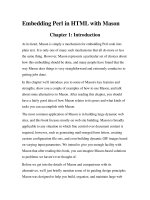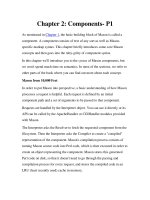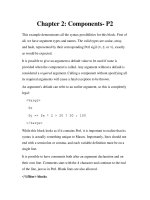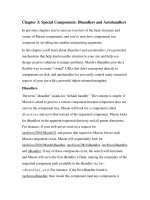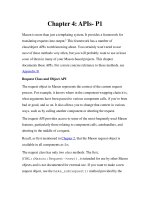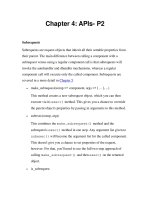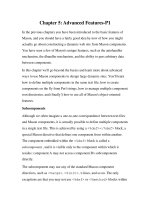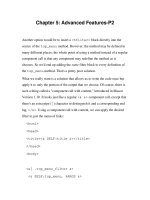Tài liệu Embedding Perl in HTML with Mason Chapter 5: Advanced Features-P1 doc
Bạn đang xem bản rút gọn của tài liệu. Xem và tải ngay bản đầy đủ của tài liệu tại đây (46.3 KB, 23 trang )
Chapter 5: Advanced Features-P1
In the previous chapters you have been introduced to the basic features of
Mason, and you should have a fairly good idea by now of how you might
actually go about constructing a dynamic web site from Mason components.
You have seen a few of Mason's unique features, such as the autohandler
mechanism, the dhandler mechanism, and the ability to pass arbitrary data
between components.
In this chapter we'll go beyond the basics and learn more about advanced
ways to use Mason components to design large dynamic sites. You'll learn
how to define multiple components in the same text file, how to create
components on the fly from Perl strings, how to manage multiple component
root directories, and (finally!) how to use all of Mason's object-oriented
features.
Subcomponents
Although we often imagine a one-to-one correspondence between text files
and Mason components, it is actually possible to define multiple components
in a single text file. This is achieved by using a <%def></%def> block, a
special Mason directive that defines one component from within another.
The component embedded within the <%def> block is called a
subcomponent , and it is visible only to the component within which it
resides: component A may not access component B's subcomponents
directly.
The subcomponent may use any of the standard Mason component
directives, such as <%args>, <%init>, %-lines, and so on. The only
exceptions are that you may not use <%def> or <%method> blocks within
subcomponents nor may you use "global" blocks like <%once> or
<%shared>.
Subcomponents are most useful when you have some piece of processing to
repeat several times that is used only in a certain specific situation and
doesn't merit its own separate component file.
Here is an example of defining and calling a subcomponent. Note that the
component is assigned a name inside the <%def> tag (the name often starts
with a period, purely by convention) and that you use the regular
component-calling mechanisms ($m->comp() or a <& &> tag) to invoke
it.
<h2>Information about certain Minnesota
cities:</h2>
% my @cities = ("Young America", "Sleepy Eye",
"Nisswa", "Embarrass",
% "Saint Cloud", "Little Canada",
"Burnsville", "Luverne");
% foreach my $name (@cities) {
<hr>
<& .city_info, city => $name, state => 'MN' &>
% }
<%def .city_info>
<%args>
$city
$state
</%args>
<table border="2">
<tr> <th colspan="2"><% $city %></th> </tr>
<tr> <td>Population:</td> <td><% $population
%></td> </tr>
<tr> <td>Coordinates:</td> <td><% "$latitude,
$longitude" %></td> </tr>
<tr> <td>Mayor:</td> <td><% $mayor
%></td> </tr>
</table>
<%init>
my ($population, $latitude, $longitude, $mayor)
=
$dbh->selectrow_array("SELECT population,
latitude, longitude, mayor
FROM cities
WHERE city=? and
state=?",
undef, $city, $state);
</%init>
</%def>
Since a subcomponent is visible only to the component that defines, and
because it has all the capabilities that regular components have, you may
think of subcomponents as roughly analogous to privately scoped
anonymous subroutine references in Perl.
Creating Components on the Fly
You may encounter situations in which you want to use Mason's templating
features and data management tools, but you don't want to create a full-
blown component root hierarchy on disk to house your components. Perhaps
you want to create a component from an isolated file or directly from a
string containing the component text.
For these situations, the Mason interpreter provides the
make_component() method. It accepts a comp_file or
comp_source parameter (letting you create a component from a file or a
string, respectively) and returns a Component object.
# Creating a component from scratch
#!/usr/bin/perl -w
use strict;
use HTML::Mason;
my $source = <<'EOF';
<%args>
$planet
</%args>
Hello, <% $planet %>!
EOF
my $interp = HTML::Mason::Interp->new( );
my $comp = $interp->make_component(comp_source =>
$source);
$interp->exec($comp, planet => 'Neptune');
And here is a component that creates another component at runtime:
<& $comp &>
<%init>
my $comp = $m->interp->make_component(
comp_file => '/home/slappy/my_comps/foo',
);
</%init>
Of course, creating components at runtime is slower than creating them
ahead of time, so if you need to squeeze out all the performance you
possibly can, you might need to think of a speedier method to achieve your
goals. And as always, benchmark everything so you really know what the
effects are.
If the compiler encounters syntax errors when attempting to compile the
component, a fatal exception will be thrown inside the
make_component() method. If you want to trap these errors, you may
wrap the make_component() method in Perl's eval {} block, and
check $@ after the method call.
Sharing Data Among Component Sections
By default, the scope of variables created within an <%init> block, a Perl
line, or any other Mason markup sections is the entire component. This is
tremendously convenient, because it lets you initialize variables in the
<%init> block, then use their values across the rest of the component. So
most of the time, the techniques discussed in this section won't be needed.
There is one limitation to variables created within the <%init> section,
however: their values won't be seen by any subcomponents you might
define. This is true for two reasons. First, the subcomponents may
themselves contain an <%init> section, so the relevance of the main
component's <%init> section isn't necessarily clear. Second, a
subcomponent may actually be a method (more on this later), in which case
it is accessible to the outside world without first calling the main component,
so the <%init> section never has a chance to run.
Sometimes you need to share data between a component and its
subcomponents, however, and for these situations Mason provides the
<%shared>
and <%once> blocks. A <%shared> block runs before the main
component or any of its methods or subcomponents and may run
initialization code. Any variables created here will be visible to the entire
main component and any of its subcomponents, including the main
component's <%init> section, if any. The <%once> block is similar -- the
only difference is that code in the <%once> block won't run every time the
component is called. It will run only when the component itself is loaded.
The initialized values will remain intact for the lifetime of the component
object, which may be until you make changes to the component source file
and Mason reloads it or until the web server child expires and gets replaced
by a new one.
A <%shared> section is great when a component and its subcomponents
have a tight relationship and may make complicated use of shared data. In
contrast, <%once> sections are useful for caching values that change
infrequently but may take a long time to compute. See Example 5-1
.
Example 5-1. sharing_example.mas
<%def .subcomponent>
visible $color in .subcomponent is <% $color %>
</%def>
visible $color in main component is <% $color %>
<& .subcomponent &>
<%shared>
my $color = 'bone';
</%shared>
A similar example, but using a <%once> section, is shown in Example 5-2.
Example 5-2. once_example.mas
<%def .subcomponent>
visible $flavor in .subcomponent is <% $flavor
%>
</%def>
visible $flavor in main component is <% $flavor
%>
<& .subcomponent &>
<%once>
my $flavor = 'gamey';
</%once>
A cautionary note about the <%shared> and <%once> sections: they do
not let you transparently share data among Apache children (this would
require actual shared memory segments and can be done with modules like
IPC::Shareable ), or among multiple components (this can easily be
done with global variables). It is also unwise to use variables created in a
<%once> section for saving state information that you intend to change,
since the next time the component is loaded your changes will be lost.
You should also remember that variables defined via an <%args> block are
not visible in a <%shared> block, meaning that the only access to
arguments inside a shared block is via the %ARGS hash or one of the request
object methods such as request_args.
Methods and Attributes
The ability to use Mason's component-level object-oriented methods and
attributes can give you powerful techniques for managing your site.
As explained in Chapter 3
, one of the major benefits of object-oriented
techniques is that they help you reduce redundancy in your site. Site
redundancy is a much bigger problem than most people realize. How many
times have you forgone a site revision because performing the revision
would be "too intrusive," and you can't afford the downtime? How many
Internet web sites have you seen that look promising at first, but fail to fix
problems and don't adapt to usage patterns over the long run? Nobody likes
to be stuck with an unmaintainable site, and the only way to avoid it is to
design the site to be adaptable and extensible in the first place. Eliminating
redundancy goes a long way toward this goal.
Methods
Methods in Mason are actually quite simple. A method is just like a
subcomponent, but instead of defining it with a <%def> section, you use a
<%method> section:
<%method .my_method>
Any regular component syntax here...
</%method>


